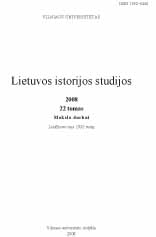SSRS Generalinio štabo viršininko maršalo Aleksandro Jegorovo 1937 m. vasario 15–26 d. vizito į Lietuvą, Latviją ir Estiją ataskaita
The report of Chief of the General Staff of USSR marshal Alexander Jegorov about his visit in Lithuania, Latvia, and Estonia on 15–26 February, 1937
Author(s): Zenonas Butkus, Magnus IlmjärvSubject(s): History
Published by: Vilniaus Universiteto Leidykla
Summary/Abstract: A. Jegorov’s report to the People’s Commissar of Defence Kliment Voroshilov that is being published has been found in the Russian State Military Archive (F. 33987. Ap. 3. B. 1035. L. 118–147). This report is a unique testimony of the USSR policy and international relations and a sign of the activity of the policy in question that in principle has never been used in scientific research. It raises doubts about to the statement that has been and is still widely used in the works devoted to history, namely, that parceling out of the Baltic states in 1939 and their occupation in 1940 have been the actions provoked by the intricacies in the international situation and may not be directly associated with the preceding Soviet policy, which in general failed to be conceptual and well-planned and that at that time they received the given states not as a result of “their Baltic policy” but directly from “the hands of Berlin”. Commenting on the goals of A. Jegorov’s visit to the Baltic states in 1937 it may be simply stated that it was a formal reciprocal visit since nearly a year ago heads of the headquarters of the armed forces of Lithuania, Latvia and Estonia Jonas Černius, Martinš Hartmanis and Nikolaj Rek visited Moscow to participate in the festivities of May 1 of 1936. The visit, however, also pursued certain propaganda goals, there was a striving to demonstrate the growing power of the Soviet State and especially that of the Red Army as well as a wish to demonstrate the concern about the security of not only their own country but also that of the neighbouring countries. Besides, the authors of the publication make an assumption that sending A. Jegorov to the Baltic States Stalin wanted, first and foremost, to instigate Berlin’s interest in Moscow and make it resume the slackening relations. The fact that the Soviet policy was supervised by the only person – Stalin – and the hasty preparation of the visit without prior decision whether it had to be a visit only to Lithuania or to all three Baltic States makes it necessary to analyze it within the broader context of international relations. Leaders of the USSR wanted to demonstrate to Germany the existence of the two options of the development of mutual relations – concord or confrontation. The notorious David Kandelaki mission pointed to concord while A. Jegorov’s visit – to confrontation and mutual competition. The visit had to bring it home to Hitler that the USSR could develop and consolidate its influence at the borders of Germany – Baltic States – or even form a military alliance with them.
Journal: Lietuvos istorijos studijos
- Issue Year: 2008
- Issue No: 22
- Page Range: 178-201
- Page Count: 24
- Language: Lithuanian

